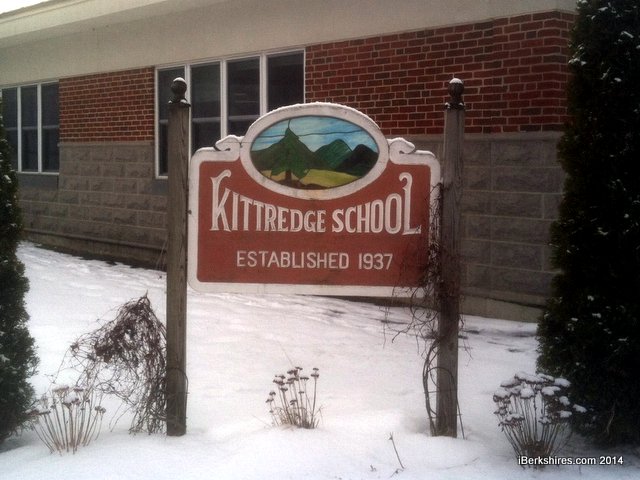Kittredge School Adds Teacher for Large First Grade
 Gisel Dwyer's first grade at Kittredge Elementary School had become too large manage. Gisel Dwyer's first grade at Kittredge Elementary School had become too large manage. |
HINSDALE, Mass. — Gisel Dwyer's first-grade pupils at Kittredge Elementary School hurriedly placed their worksheets into their respective folders and sat attentively, waiting for the start of their show-and-tell session on Friday.
After engaging in a group-reading exercise about penguin cams — high-tech cameras built inside of faux feathered animals for scientists to observe creatures in the natural habitat — the kids were left with a block of time to present their most beloved items and stories to the class before a short outdoor recess period.
But they had to hurry. After all, inclement weather delayed the onset of the school day by two hours and Dwyer still had to work outdoor recess into the school day by 2:15 p.m.
As the lone first-grade teacher of an oversized classroom of 26 students, the attention her students get has become a recurring issue. With two more students expected to join the first grade at Kittredge, the problem would only be expected to get worse, had the School Committee not voted to allow Dwyer to receive permanent teaching support.
“It's not typical that I actually get to meet with all of them. I can't do what I need to do for them. It's a little frustrating,” said Dwyer, who has been a teacher at Kittredge for six years.
As students show off their toy monster trucks, animal hats and karate belts, and tell stories about encounters with snakes, new kittens and miniature snowmobiles, they each have a limited amount of time to present, let alone fielding any questions or comments from their peers.
"They don't have enough time to really share," Dwyer said. "We try to make it work. I try to do the most for them. I do what I can. I'm a little overwhelmed at times."
Crowded Classroom
A week before the school year began, the number of students enrolled in Dwyer's first-grade elementary class was 18. During the ensuing week before classes began, that number grew to 24.
"The joke was, Gisel, when she walked in, the secretary would hug her and say, 'we have another student,'" Kittredge Principal Deborah White said. "Now, the joke is that [Rhonda Bilodeau's] hugs aren't nice anymore, because it always follows with that."
Prior to the break in classes in December for the holidays, two more first-grade children enrolled at Kittredge. During Christmas break, another two parents called White to say they were moving into town with first-graders, leaving a total of 28 students expected to be enrolled in Dwyer's class in the new year, up over 35 percent from the standard.
With a declining student population in the Central Berkshire Regional School District, the influx of first-grade children is curious. In this instance, White said the inflation in enrollment can be considered a matter of coincidence.
"It's really a fluke. A bunch of families that moved in have 6-year old kids," White said with a bit of a chuckle. "We've had a few other kids move in, like siblings of these kids, but it's just a big increase. It's a really strange thing to hit one class."
According to White, the average classroom size at Kittredge is 18 pupils, give or take a couple. The school's fifth grade also presents an outlier number with approximately 40, though she said it is easier for upper grades to handle a greater number of students.
At a different school, such as Craneville Elementary, which has four sections of first grade, it would take 20 or so students for it to be drastically impacted, White said. The fluctuation can be curbed easier by redistributing students to various classrooms, lessening the burden on one particular section and, in turn, one teacher.
During a recent visit to her classroom, Superintendent William Cameron said Dwyer's class was one of the most well behaved he has observed, White said on Friday at Kittredge. Still, the need for administrative support for Dwyer lies in issues not readily observable from the pupils' demeanor.
"We are outside of the classroom with 26 children and you don't hear chaos. Gisel is a fantastic teacher. She has great classroom control, but she just doesn't feel she can get to the students who need the extra support. It's taking her forever to get through a lesson and then there's not a lot of time afterward to [meet with] those groups that need the extra support afterward," White said.
Displaying examples of different books at different reading levels, Dwyer demonstrated the discrepancy between the reading comprehension some children have developed relative to others. Three different stories about Roger Rabbit, Freddie and the Frog and a policeman on duty illustrated the need to support student reading comprehension in varying ways, including enhancing the reading levels for below-average first-graders while challenging those who have already exceeded that prescribed level.
The more students Dwyer has, the more difficult it is to accomplish this on her own. Ultimately, the issues she faces can be greatly affected with a large class size by such simplicities as potty breaks.
"It's when I need to do reading with them, or when I'm teaching math concepts. That's the problem. Because I have kids reading at the beginning-to-middle of a second-grade level and I have kids who are a little behind of where they should be right now, so it's a big difference," Dwyer said. "I have about 15 minutes to work with each group reading independently at my tables and if the kids are having little issues, like they need to go to bathroom or they can't get the mp3 player to work, or they've lost their book — little things like that, it really creates a burden, because it will take two or three minutes out of their reading time and they need every minute of it."
Following show-and-tell on Friday, the children had about 15-20 minutes to get their winter garb to get ready to play outside. As the kids gathered their individual belongings — applying their hats, gloves, mittens and scarves, zipping up their snowpants and coats and lacing up their snow boots — they use up about a third of their recess time, in some instances, despite Dwyer's assistance.
A special needs paraprofessional, Tiffany Willis, was there to help lead the children outside, though she is not always available. White and the school district administration recognize that this problem will inevitably persist.
Addressing Alternatives
In the first semester of the current school year, beginning in September, Dwyer was aided by a student-teacher from Westfield State University, Alyssa Esposito. Her presence was effective, allowing Dwyer a greater opportunity to focus more on individual students, which isn't always the case.
 A student-teacher had been a critical help this fall but the school district decided a permanent solution was needed. A student-teacher had been a critical help this fall but the school district decided a permanent solution was needed. |
"Sometimes, [student-teachers are] more work. It doesn't always work out where you get a student-teacher that's competent enough to start working with kids early on," White said. "[Esposito] was walking around redirecting kids, helping them stay on task, helping them with anything they didn't understand; so, it really wasn't as big a problem until after she left," White said, in reference to size of the classroom.
It is typical for college education programs at Westfield and the Massachusetts College of Liberal Arts to choose Kittredge as a site for student-teaching, a requirement of undergraduates to earn particular teaching degrees. Though universities and colleges typically initiate the process whereby those partnerships take place, not the other way around, according to White.
After Esposito completed the allotted number of hours required of her by Westfield, she stayed for an extra week or two, to gain more experience. Just prior to Thanksgiving, she left the area, creating the professional void that Kittredge has been seeking to fill.
Since then, a collection of help from paraprofessionals and parents has lessened the burden Dwyer said she feels, as a more permanent solution was being decided on.
One teacher, Keri Esposito — who is Alyssa's sister-in-law — said she spent a lot of time in Dwyer's classroom as a permanent substitute filling in for Willis and Dwyer herself.
"One of the things that I noticed was how I was able to be a second adult in the room, how I was able to conference with some of the students on their writing," Keri Esposito said. "I could spend more time with the students at that time than she could have, because she can't be in two places at once."
Several parents volunteered their free time to help out in the classroom.
"They have seen first-hand what is going on in the classroom and they're willing to be there because they know the difficulty," White said. "Being in there, coming in a couple times a week, they continue to [say], 'What else can we do? What do you need us to do?'"
Impressed with the level of support shown from parents, White and the School Committee understood their presence in the classroom as a short-term solution.
"There hasn't been anybody that has called me angry, upset. When they make a call or stop in to talk to me, it's more of a problem solving,” White said. “When we were talking about this, I asked [parents] to trust us, we were going to work on it, and they did.”
White initially had a discussion about the first-grade teaching issue with the School Committee's finance subcommittee, yielding support for the use or hire of a paraprofessional as a solution, which would be a low-impact item to the current budget.
As the issue was being addressed internally, White and the school administration created an "anticipated" job posting and listed it publicly, so as to expedite the hiring process, should a new full-time position be deemed necessary.
With the possibility for a second full-time teacher, comes a question of how to implement one. White said the nuances in co-teaching make it a specialized skill set that not every teaching professional has, speaking from personal experience.
"I did some co-teaching when I was [teaching] in middle school. By choice. The other teacher and I chose to co-teach. We had a really good working relationship with each other, so in the middle of a lesson, when she was talking, if she was leading the lesson, I could come in and add information and I knew I wasn't going to step on her toes. But you have to have that relationship with a teacher," White said.
"Otherwise, there are portions of the day where one teacher's teaching and the other teacher is sitting in the back with the kids listening. If you put them into two rooms, the same things is going to happen: two teachers in small groups with kids working independently. Some of it is personal preference, but some of it is training and relationship-building between the teachers that would do that co-teaching, that we just don't think that we're there yet."
As a result, the idea of splitting the class into separate rooms was more attractive to White, and ultimately the preferred solution for the administration.
School Committee's Solution
Before the School Committee meeting a couple weeks ago, parents asked White how they could be supportive in the school's request for a new full-time teacher for the rest of the school year.
"I said your presence would speak volumes so you can talk if you want, but you don't have to," White said.
A slew of parents attended the meeting, along with Dwyer and Keri Esposito, all in support of the hiring of a new teacher. In the portion of the meeting dedicated to public response, two parents commented on how their kids were being adversely affected by the first-grade class size at Kittredge, including one who said his child expressed explicitly his need for support.
"When my 6-year-old boy tells me that he's not getting enough attention in reading, that kind of tells me that there is an issue we need to do something about," Mark Dostie said.
Dwyer spoke on the effectiveness of the support she received from the student-teacher earlier in the school year and said that as the school year goes on, and curriculum shifts from relearning concepts to presenting fresh concepts, she would risk doing a disservice to the children without professional assistance.
In a unanimous vote, the School Committee approved a motion to add a second, full-time teaching position to Kittredge.
The move will cost the school district between $25,000 to $30,000, depending on the negotiating of a new contract. According to Cameron, the hiring will only affect the school district's budget this fiscal year, as he does not believe the teaching position will be needed next year.
White said the "bubble" of students in the fifth-grade class at Kitteredge will burst as they graduate to middle school in June, leaving a vacancy in the second full-time teaching slot created for that class that can be applied to the presumable rollover of children into next year's second grade.
Based on the anticipated job posting created by White, four candidates were interviewed prior to the School Committee's ruling. On Friday, White recommended Keri Esposito.
“She's in that classroom, so she knows the kids already. She's ready to start,” White said, noting that Esposito has already completed some of the hiring formalities, such as a Criminal Offender Record Information (CORI).
The recommendation required the approval of Cameron for it to become effective.
Rearing a Second Classroom
Esposito subbed at Kittredge in Dwyer's classroom last Monday, initiating the first stage of the classroom's meiosis. The two colleagues will discuss the most effective way to transition the children from a setting to which they've grown accustomed to one that is more institutionally manageable.
 The elementary school also has a 'bubble' in the fifth-grade that will burst as the children head to Nessacus Middle School. The elementary school also has a 'bubble' in the fifth-grade that will burst as the children head to Nessacus Middle School. |
Esposito completed her student-teaching in the school district and has been a substitute intermittently for the last three years. In that time frame, she spent time teaching and tutoring in Indiana and teaching a fourth-grade class in the Netherlands, when her husband was relocated as part of a project management program through SABIC.
Having taught the same students at Kittredge in their kindergarten classroom, and working with them in Dwyer's classroom, Esposito said she will use her experience advantageously.
"The kids know me. They know my expectations. I think the transition, just from days that I've subbed, when Gisel's not there, I still can handle the group of students behaviorally and academically, so I think that's going to benefit me when we split the classrooms," Esposito said.
The class will be split in a way that promotes diversity, including mixing children of different learning abilities and genders. Children will naturally get used to being in different rooms and continue learning how to better understand "sh" words.
A permanent substitute teacher will replace a pregnant Dwyer in March, as if the students did not have enough practice at learning to adapt. To Esposito, the School Committee's recent decision to add a second full-time teacher to facilitate the growing number of first-grade children at Kittredge will help to ease out of an unfortunate situation.
"Of course, because [Dwyer] is very pregnant, someone's going to have to take her position and another teacher to come in three-quarters of the way through the year and be able to do what she has done and have it work as it has been working for her would also be a very big challenge for anybody."
Tags: elementary schools, teaching,















